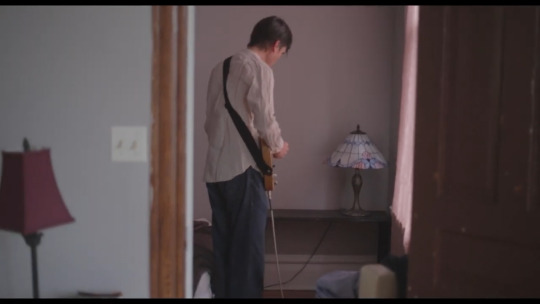#bill mackay
Text
youtube
Pre-California by Bill MacKay
35 notes
·
View notes
Text
youtube
bill mackay -- keeping in time
2 notes
·
View notes
Text
BCMC — Foreign Smokes (Drag City)
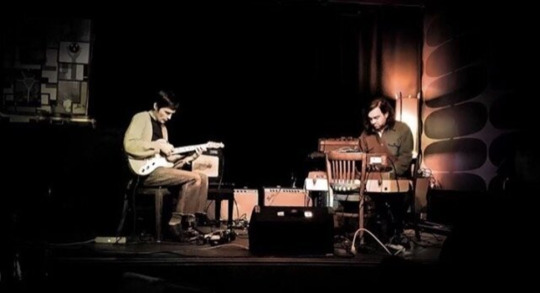
Photo by the Visualist
Each of the four pieces on BCMC’s Foreign Smokes, a full-length collaboration between the guitarist Bill Mackay and the multi-instrumentalist Cooper Crain, begins somewhere small — a few investigatory notes from Mackay’s guitar, a warm drone from Crain’s keys. Ideas are trotted out, the pace and intensity accelerating when both players latch onto something. There is little in the way of pyrotechnics, though the music never stands still or bogs down. This is improvisation as exploration and exchange; one player cuts a trail in a few directions, giving his counterpart options; gesturing with a question, rather than dictating anything.
At the outset of the third track, “Ripple in High Tide,” Mackay bends a few short notes, while Crain sets twinkling touches around the margins. They go on like this until a prodding two-note bass pattern rises up and marches forward. It is a steadying presence, a clockwork plunk of pebbles producing the titular wavelet. Mackay’s picking remains relatively plain, allowing Crain an opening to send shafts of glimmering synth down over the proceedings. Crain’s part established, Mackay takes another step, playing each note just a bit harder, sending the echo farther out. Halfway through, Mackay locks into step over the bassline, walking his guitar into compact bursts as synths sway and sparkle and the organ drone applies greater and greater pressure. This model for playing off of each other — a sonic wall built one intriguing stone at a time — allows either one of Crain or Mackay to incite the action without overshadowing what they’re creating together.
A pearly organ riff emerges from the opening ease of the last song, “Sunset Saturn.” After a few bars, Mackay joins in, sending picked guitar notes tailing out into the reddening sky. The pair trade the spotlight over a persistent drone until they’re deep in conversation; Mackay’s guitar is vivid and peaceful, strumming over a meandering organ which builds to a pleasant bluster, Crain letting loose like a cosmic prog-rocker. Throughout Foreign Smokes, Crain plays with great vitality and without ostentacion, allowing his parts to grow organically from the scene he and Mackay are forming, with the tangible excitement of ad hoc realization. Like his work in Bitchin Bajas, the space illuminated by his music is liable to shift; the ground you’re standing on is still solid, but look up and your surroundings have swirled and warped. What begins in tranquility can quickly turn sordid and eerie, dropping you somewhere more brambled and complex by the end. Sometimes, however, there’s unease from the start. Track two, “The Swarm,” is underlaid by drawn out minor synth chords, which are soon joined by tense squiggles of guitar. Fuller, ostensibly more charismatic guitar and organ parts strive to break through over the top, but the song’s anxious feel breeds on these shifting keys and billowing textures; the bright and the palpable unsettled by hoots from a threatening forest.
The sound of Foreign Smokes is deceptively straightforward considering the rich ambience and evocative moods the pair achieve. While it rewards multiple listens with novel wrinkles – cymbals that settle into the mist, a flinty synth stab that might’ve been shorn from a Depeche Mode chorus – and is fleshed out and dramatized with a supporting array of synthesizers, the album’s greatest bounty is gathered from the immediate and simple interplay between Mackay’s lightly affected guitar and Crain’s similarly stripped down organ. The first time through, you hear Foreign Smokes in the familiar voices of those instruments, piped and plucked from around the corner, music filling a room you’re not sure you’ve reached until you’re at the center of it.
Alex Johnson
#BCMC#foreign smokes#drag city#alex johnson#albumreview#dusted magazine#bill mackay#cooper crain#ambient#electronic#chicago#Bandcamp
4 notes
·
View notes
Text
BCMC & andplay Live Show Review: 2/20, Constellation, Chicago
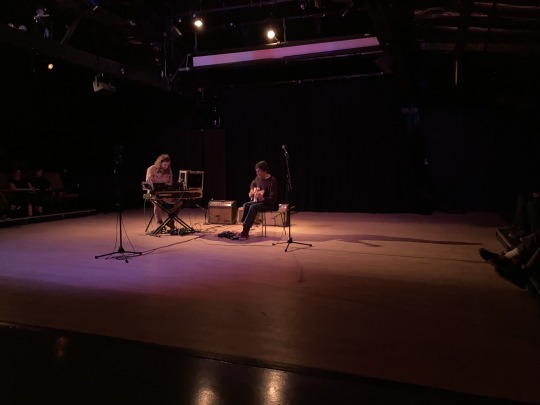
BCMC
BY JORDAN MAINZER
Tuesday night marked the beginning of the Peter Margasak-curated Frequency Festival, an annual event hosted by Constellation that focuses on contemporary classical and experimental music. Though this year's lineup is heavy on microtonal music, specifically string players, the headliner of night one was a guitar-and-synth-wizard supergroup. BCMC is guitarist Bill MacKay and Cave/Bitchin Bajas multi-instrumentalist Cooper Crain. They had been playing live together for a few years before releasing their debut album Foreign Smokes last year via Drag City. Unlike what I imagine was the experience of many folks in the crowd on Tuesday, this was my first time seeing BCMC live. Witnessing their performance after their album was released, meaning I had a number of months to digest it, gave me a greater appreciation for how the duo was able to, live, build off of their compositions.
BCMC started off with abstract sounds, gradually becoming more concrete before reverting back to rounded noise. MacKay's bluesy guitar riffs embedded within Crain's synthesizer hum, replete with a sense of motion akin to a chugging train, simultaneously swirling and gentle. At times, the songs turned percussive, via pulsations, as MacKay either meandered or ripped slide guitar licks. Even Crain got an opportunity to solo on the keyboard on "The Swarm". Simultaneously tactile and droney, BCMC were able to lull you into hypnosis and suddenly capture you at the command of their instruments.

andPlay
The opening set from NYC-based string duo andPlay, meanwhile, set the tone (no pun intended) for the rest of the festival's ethos. Violinist Maya Bennardo and violist Hannah Levinson performed the two pieces that make up their latest album Translucent Harmonies (Another Timbre), both of which use just intonation. Kristofer Svensson's "Vid stenmuren blir tanken blomma" (“By the Stone Wall, Thoughts Become Flower”) emphasized extremely short strokes of different lengths and volume, using pauses and ultimate silence to create a sense of tension and disintegration. At times, one player would play a note--a mere pluck--and the other would continue their stroke, resembling a sort of synaptic process. Ultimately, the piece was paradoxically meditative, consistent in its lack of consistency. Their second piece, Catherine Lamb's "Prisma Interius VIII", was comparatively deliberate, the players playing in tandem at times and not just off of each other. As a duo, in contrast to larger ensembles who have played on other recorded versions of the piece, Bennardo and Levinson were able to strip "Prisma Interius VIII" down to its essential elements. Though there were many contrasts between andPlay and BCMC--in instrumentation, in groove (or lack thereof), in space--the two acts shared a common desire to hold your patience and deep attention, toy with your expectations, and make you reflect.
#live music#bcmc#andplay#peter margasak#bill mackay#drag city#maya bennardo#hannah levinson#another timbre#foreign smokes#frequency festival#constellation#cave#bitchin bajas#cooper crain#translucent harmonies#kristofer svensson#catherine lamb
0 notes
Text

Album Review: Black Duck - Black Duck
Black Duck’s Black Duck is a wordless collection of three compositions and five improvisations that indicates the trio would do best to write an album’s worth of material if it decides to record a followup.
The proper songs - guitarist/bassist Douglas McCombs’ wobbly “Of the Lit Backyards,” guitarist Bill MacKay’s gritty “Delivery” and drummer Charles Rumback’s earthy “The Trees are Dancing” - stand on their own and together provide much-needed, melodic context to their on-the-fly counterparts. Those numbers, which consist of varying levels of formlessness from the extended tuning of “Second Guess” to the Black Duck in Grateful Dead “Space” that is “Thunder Fade that Earth Smells,” work only within the contours of the self-titled LP. And even that is a stretch.
As such, the 35 minutes of Black Duck ultimately fall into the category of background music or soundtrack to a bong sesh. Yet “Backyards,” “Delivery” and “Trees” are songs that deserve a spot in the foreground of any music collection.
Grade card: Black Duck - Black Duck - C+
8/14/23
1 note
·
View note
Text
youtube
They got a name for the winners in the world
I want a name when I lose
They call Alabama the Crimson Tide
Call me Deacon Blues
1 note
·
View note
Text

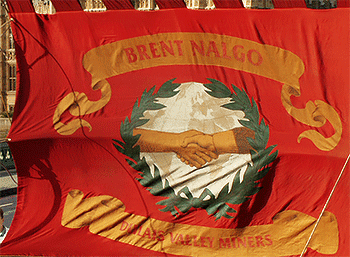



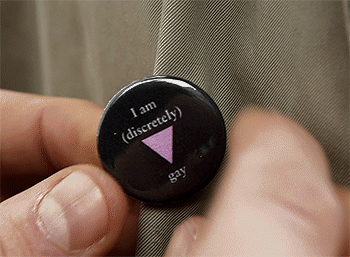

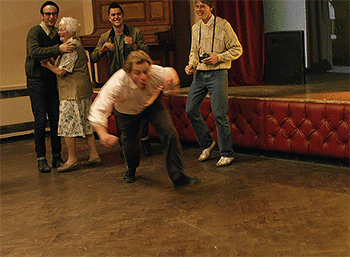
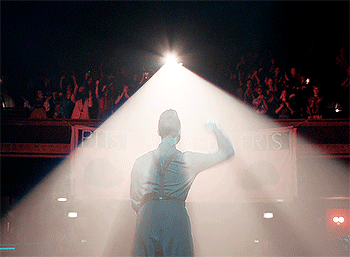
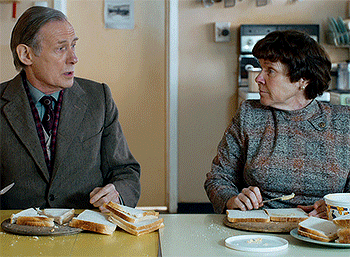
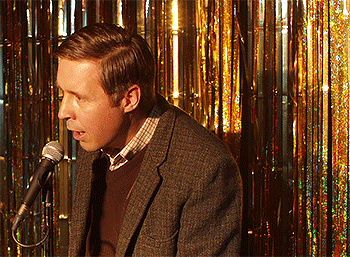

I've worked a few tough crowds myself over the years.
In politics?
In panto.
#pride#pride 2014#prideedit#movieedit#filmedit#filmgifs#cinematv#perioddramaedit#pride movie#andrew scott#ben schnetzer#dominic west#paddy considine#imelda staunton#bill nighy#george mackay#mine#myedit#Tay's Trash#usermichi#userpedro#userkei#all time fave#rewatched it recently and felt like giffing#userrobin
1K notes
·
View notes
Text
having zero social media presence is honestly the most attractive thing a celeb can do
#it’s all about the mystery#it might be a red flag for most ppl but for me it’s the biggest green flag#all my faves pretty much don’t have social media and i love that#like#mike faist#joseph quinn#(ok he has insta but isn’t in charge of it)#hayden christensen#george mackay#evan peters#bill skarsgård#and now#ewan mitchell#love all my private boys <3
939 notes
·
View notes
Text
Killer Clown, fanatical husband, avenging angel times two, well-dressed prick.

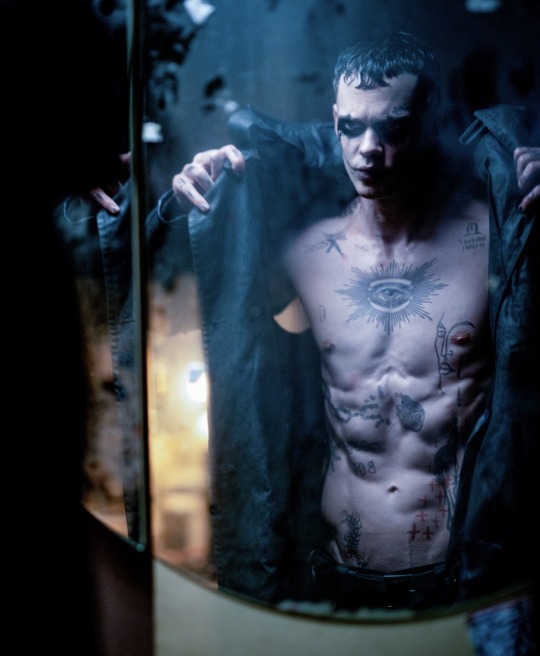
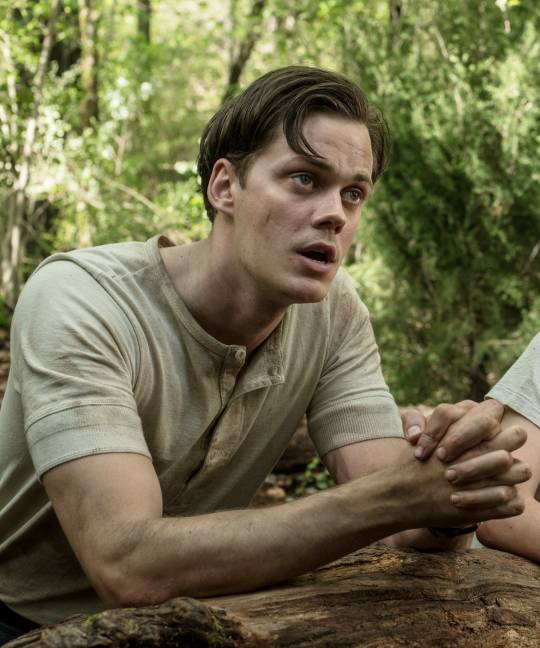


When is Bill Skarsgård going to come into his romantic lead era like he did in an episode (titled "Layover") of AMC+'s SOULMATES?
-His costar in the episode is Nathan Stewart-Jarrett (late of HBO Max's GENERATION+, CANDYMAN, ANGELS IN AMERCA and MISFITS). Those in the U.S. will be able to see Stewart-Jarrett this week in the eleven times BIFA nominated film FEMME.
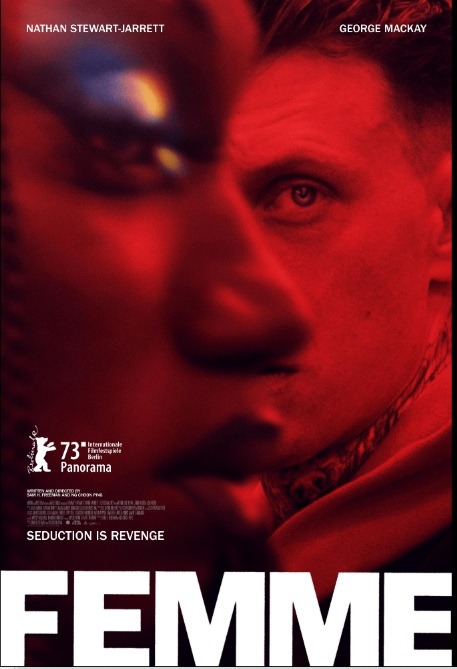
Stewart-Jarrett and his costar George Mackey (CAPTAIN FANTASTIC, 1917) were the sole winners for the film, sharing the award for Best Joint Lead Performance.
A well worthy win.
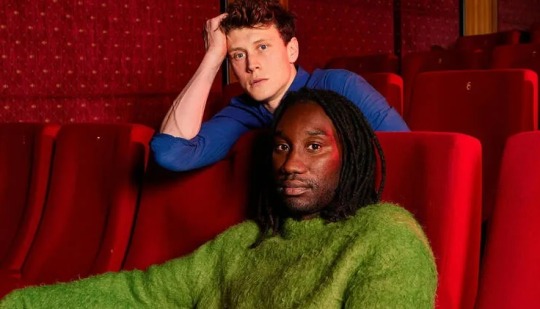
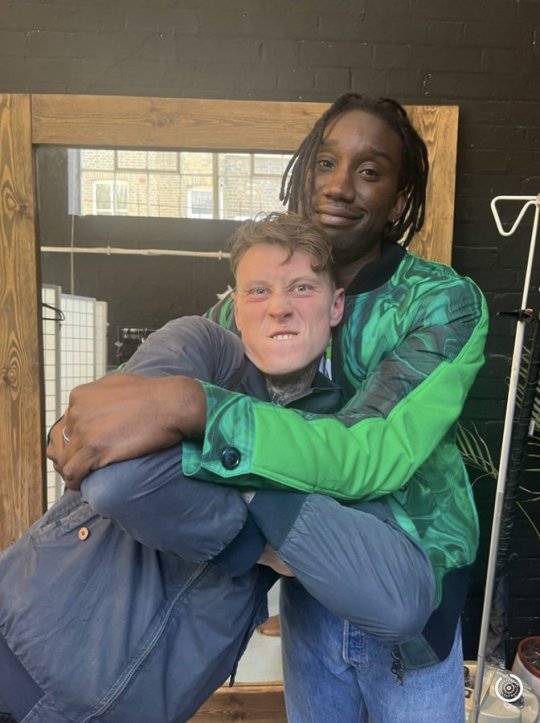

The film- originally a short starring Paapa Essiedu (GANGS OF LONDON) and Harris Dickinson (TRIANGLE OF SADNESS),


takes a big departure from the short and was reconfigured into an intoxication, nail biting tale of revenge.
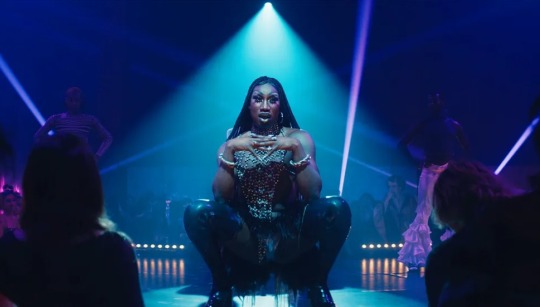

#bill skarsgård#bill skarsgard#nathan stewart jarrett#femme#george mackay#the crow#boy kills world#movies#lgbtq#mlm
26 notes
·
View notes
Text

11.22.63 (2016)
#2016#film#series#TV show#television#11.22.63#George MacKay#Bill Turcotte#Sarah Gadon#Sadie Dunhill#James Franco#Jake Epping#Chris Cooper#Al Templeton#Daniel Webber#Lee Harvey Oswald#John F. Kennedy#time travel
51 notes
·
View notes
Text
youtube
bill mackay -- when i was here
2 notes
·
View notes
Text
Black Duck—S-T (Thrill Jockey)

Photo by Evan Jenkins
Black Duck by Black Duck
Chicago is the kind of town where it sometimes seems that everyone has played with everyone else, and indeed within and even across genres including jazz, post-rock, improvised music, folk, blues, electronics and even contemporary classical music, cross pollination proliferates. So it is not exactly surprising to see two Ryley Walker duet partners join forces with a Tortoise founder, who has himself, at times, played with both of them, and in more than one project. Black Duck might be an enduring musical undertaking or a one-off permutation of the Windy City’s considerable talent pool. Either way, it’s a winner.
To be specific, Black Duck is made up of Bill MacKay, Doug McCombs and Charles Rumback, all three of them artists whose work ranges across genres and puts them into contact with each other in a variety of contexts. Just for instance, when I went to see Meg Baird in Chicago last year, Doug McCombs was playing in her band as well as Chris Forsyth’s outfit, and Bill MacKay stood just off stage waiting to be called up by Forsyth. Rumback wasn’t there that night, but you get the idea. Bands are a fluid thing in Chicago.
MacKay’s main instrument is guitar—and his playing ranges from finger-picked folk to raging electric distortion to eerily beautiful slide. McCombs is best known for playing bass in Tortoise, for his multi-instrumental work in Brokeback and for turning up whenever musicians need help finding a groove. Rumback is a drummer with a background in jazz and a strong melodic sense; in his duets with Ryley Walker, he served as an equal partner, driving the song forward as much as the guitarist. In Black Duck, they draw on many different aspects of their respective, eclectic backgrounds, flitting freely from sun-drenched cosmic country, to driving kraut rock, to radiant, enveloping ambiences, all played so expertly that it seems effortless, though it probably isn’t.
Consider, for instance, “Of the Lit Back Yards, the trippy country daydream that kicks off the album, brushes shuffling, bass grumbling, guitar dripping unhurried sweetness. If a roadhouse bar band died and went to heaven, it might sound a lot like this. It has almost nothing in common with the driving blues vamp that powers “Delivery,” bass line licking flames around a motorik beat, and yet the two sit comfortably one track away from one other in the sequencing. What’s between them is even more incongruous, the shivering atmospheres and rolling thunder of “Foothill Daze” (oh, hey, there’s that unearthly slide I was talking about). And yet different as these tracks are, they fit together in a strange surreal way, like the soundtrack to a movie you don’t quite understand, and they are undeniably beautiful.
To my ears, “Lemon Treasure,” near the end, does the best job at bringing all these different elements together. It pulses like a locomotive. It dreams like a lotus eater. It lets notes of soap bubble delicacy bloom alongside rough-riding rhythms. It’s an irresistible groove and an opium vision, and when you think about it, who else could have made this track? These three guys, that’s who. Long live Black Duck.
Jennifer Kelly
#black duck#thrill jockey#jennifer kelly#albumreview#dusted magazine#bill mackay#doug mccombs#charles rumback#chicago#jazz#improv#folk#krautrock#blues
5 notes
·
View notes
Text
Pride is returning to cinemas for its 10th anniversary
'Comfortably one of the best British films of the 2010s is the wonderful Pride, an uproariously funny and really moving ensemble film set in the 1980s. Led by George MacKay, Andrew Scott, Ben Schnetzer, Faye Marsay, Dominic West, Imelda Staunton, a sex toy, Paddy Considine, Bill Nighy and Freddie Fox, it felt like a movie out of nowhere when it first arrived.
Telling the story of the miner’s strike in the UK in the 1980s, and the efforts of a bunch of lesbian and gay activists to support them, it still remains something of a one-off. Penned by Stephen Beresford and directed by Matthew Warchus, the modestly-budgeted film hardly set the box office alight on its initial release, but it’s earned a rich and deserved reputation since for a film that’s well, well worth seeking out.
With that in mind, for the tenth anniversary of the movie, the lovely people at Park Circus are offering an opportunity to see the film on the big screen again. It’s going to be re-releasing Pride in cinemas on 7th June across the UK. It’s currently listed as going to just over 25 screens, and as such is likely to gravitate towards big cities. But it’s worth having a word with your local independent cinema to see if it can play the film.
I’ve written before on this website about why I think Pride deserves a much bigger audience, and it’s really lovely to see the opportunity once again to catch it on the big screen. Very much looking forward to doing so...
Finally, that synopsis…
Pathé’s Pride is about the extraordinary true story of two very different communities who unite to defend the same cause. It’s Summer 1984, Margaret Thatcher is in power, and the National Union of Mineworkers are on strike! At the Gay Pride March in London, a group of gay and lesbian activists decides to raise money to support the families of the striking miners. But the only problem is the Union seems too embarrassed to receive their support. Not discouraged, the activists ignore the Union and go direct to the miners. They identify a small mining villiage in Wales to make their donations to the community in person. This journey begins a surprising partnership between two seemingly alien communties as they fight for the same cause.'
#Pride#10th anniversary#Andrew Scott#George Mackay#Bill Nighy#Imelda Staunton#Dominic West#Stephen Beresford#Matthew Warchus#Faye Marsay#Paddy Considine#LGBTQ#Freddie Fox#Ben Schnetzer#Gay Pride
5 notes
·
View notes
Text
youtube
Song Review: Black Duck - “Second Guess” and “Lemon Treasure”
Improvisations, by their nature, can be hit or miss. And in a concert setting, the thrill of a band going for it is typically worth the risk.
As Black Duck, guitarist/bassist Douglas McCombs, guitarist Bill MacKay and drummer Charles Rumback seem to think that path also works in the studio. But as the made-up-on-the-spot “Second Guess” and “Lemon Treasure” make clear, it doesn’t.
They follow “Of the Lit Backyards” - one of three composed pieces alongside five free-form numbers on Black Duck’s forthcoming (June 23) self-titled debut - and suggest more writing and fewer improvs might’ve been the ticket.
The former is little more than tuning given a title as electric guitars drone ethereally over Rumback’s clambering drums. There’s no discernible melody and given “Second Guess” doesn’t lead to one, it’s not a particularly good use of five minutes of ear time.
youtube
“Lemon Treasure” solves the lack-of-melody issue and adds some rhythm. But it, too, is jammy and noisy, the kind of thing that would work better as an on-stage coda than a studio song.
Grade card: Black Duck - “Second Guess” and “Lemon Treasure” - C/C-
6/13/23
0 notes
Text
242 - Pride

This week’s episode is one we have promised for some time: 2014′s Pride. The film tells the true story of Lesbians and Gays Support the Miners, a queer activist group that partnered with a Welsh town in the 1980s during the mining strike under Thatcher’s rule. Following the lives of both the straight townsfolk and the queer Londoners, the film paints a portrait of queerness, allyship, and activism that rings true today while also satisfying on a crowd-pleasing level. After launching at Cannes’ Directors Fortnight and winning the Queer Palm, the film launched in the fall of 2014 to some ardent critical fans, but didn’t cross the Oscar finish line.
This episode, we talk about the theatre career of director Matthew Warchus and the film’s comforts in this current tumultuous moment for queer people. We also talk about the film’s tremendous ensemble headlined by Imelda Staunton and Bill Nighy, gay infighting, and unofficial THOB mascot Men Trussler.
Topics also include the 2014 Cannes Film Festival, Monica Bellucci bluntly listing director names, and the concept of Festival Regret.
Links:
The 2014 Oscar nominations
Subscribe:
Spotify
Apple Podcasts
Google Play
Stitcher
youtube
youtube
#Pride#Matthew Warchus#Imelda Staunton#Bill Nighy#George MacKay#Andrew Scott#Dominic West#Ben Schnetzer#Joseph Gilgun#Jessica Gunning#Menna Trussler#Paddy Considine#Karina Fernandez#Jessie Cave#cannes film festival#Queer Palm#Academy Awards#Oscars#movies
34 notes
·
View notes
